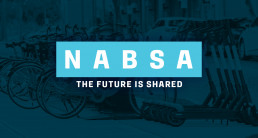Shannon MacLeod - Advocacy & Government Affairs Director

Advocacy & Government Affairs Director
Shannon MacLeod
North American Bikeshare & Scootershare Association
Shannon MacLeod is an experienced political and policy professional with a diverse background in local, state, and federal advocacy. She served as Policy Director and later Chief of Staff for the Mayor of New Hampshire’s largest city, where she played a key role in developing and implementing policies on transportation, economic development, and affordable housing. Shannon has held leadership positions on multiple presidential campaigns and senior roles in several local, federal and statewide political campaigns, bringing extensive experience in campaign strategy, paid communications and grassroots engagement.
What do you love most about working for NABSA?
I’m really excited to join the NABSA team and be part of the work to expand the micromobility options that make our cities more sustainable, connected, and livable. Micromobility options make a real difference in people’s daily lives and contribute to transportation systems that work for everyone, and I can’t wait to work with people who care about this mission as much as I do!
What experience or insight do you bring to your position with NABSA?
I bring a mix of hands-on implementation and policy and advocacy experience to NABSA. I’ve had the opportunity to work directly with municipalities as they’ve navigated implementing bikeshare and scootershare programs and helped write successful federal funding requests that include significant investments in bike infrastructure. I’ve also created and implemented advocacy strategies and worked closely with lawmakers to shape policy outcomes to support more sustainable and welcoming communities.
Connect with Shannon:
Shannon@nabsa.net
John Lankford - Board Member

Board Member
John Lankford
Third Lane Mobility
John leads partnerships and policy for Third Lane Mobility, parent company of shared micromobility operators Bird and Spin. His work in transportation dates back to 2009 when he co-founded the political action committee Walk Bike Transit that lobbied candidates in the Chicago municipal election cycle for more investment in bicycle, pedestrian and transit infrastructure. He then worked at Active Transportation Alliance where he led community engagement around the installation of Chicago’s first protected bike lanes as well as the city’s Streets for Cycling 2020 Plan. In 2019, John joined Spin where he focused on building Spin’s portfolio of campus programs before stepping in to lead government partnerships and policy as well. Beginning February 2025, John heads up government partnerships and policy for both Bird and Spin.
John lives in suburban Chicago where he and his partner have 3 children under the age of 4. Their primary mode of transportation (and greatest parent hack) is getting around primarily by electric cargo bikes.
Logan Spackman - Board Member

Board Member
Logan Spackman
ROAM Share
Why is being a board member of NABSA important to you?
I believe in the power of shared micromobility as a force for good. When we take a bike or scooter to commute, recreate, or travel in our neighborhoods we do more than connect to its people and places—we create resilient, sustainable and equitable communities in which we are all participants. NABSA’s leadership will play a critical role to play in establishing, informing, and promoting the positive impact shared micromobility systems have in the North American region. I’m excited by the opportunity to contribute my learning, energy, and passion toward initiatives and work that will help our industry succeed in delivering on its promises. My experience with our nonprofit ROAM Share–and since joining the micromobility sector–has informed my perspective on bike- and scooter-share as a dynamic tool to help communities meet some of their greatest challenges. I’m eager to develop and strengthen harmonious relationships among the broad spectrum of stakeholders in micromobility. As a new voice in the industry, I know collaborating with NABSA board members is an experience that will shape my own understanding of our industry and what is possible when we work together.
What experience or insight do you bring to your position on the board?
Since joining the micromobility industry, I’ve worked to expand bike share access across diverse communities through grant application, pursuit of corporate sponsorships, and fostering partnerships with local transportation agencies. Having worked in both management and administrative capacities, I understand micromobility challenges at both the implementation and operation levels. While BikeLNK City Manager, I fostered meaningful relationships with city officials to promote effective and sustainable bike share operations. During this tenure I also prioritized expanding bike share access to historically underserved communities – including aging adults – through educational opportunities and collaborative programming with local NPOs. And In my time as ROAM Programs Manager, I’ve gained valuable insights into the diverse funding mechanisms required to make nonprofit bike share happen. This experience – paired with a background in relationship management, CRM, fundraising, and a lot of biking to local coffee shops – has shaped my approach to understanding micromobility and the opportunities ahead for our industry. My foundational philosophy – let’s build this thing together.
David Powe - Board Member

Board Member
David Powe
Chicago Department of Transportation
Why is being a board member of NABSA important to you?
It would be an excellent opportunity to learn from my peers across North America. I would also like to impart the knowledge I’ve gained working with other agencies on pilots, resolving issues, and expanding our system. In particular, I would like to develop my leadership skills so I can make Chicago’s Divvy system more equitable and efficient.
What experience or insight do you bring to your position on the board?
I’ve got a background in mobility advocacy and operations. In particular, my knowledge of government and day-to-day system oversight would position me well to dive into contemporary issues in the micromobility sector. I would like to support advocate and government agency employees in their work to move the needle on improving micromobility in their worlds!
Edward Inlow - Board Nominee

Edward Inlow
Shift Transit
Sector: For-Profit
Why are you interested in being a NABSA Board Member?
As a current NABSA board member, I was thrilled to bring my eleven years of industry experience to the NABSA team while also serving as the current Chairperson of the NABSA Development Committee. We have a lot of great work in progress and I’d be honored to continue working towards accomplishing those goals while moving the industry forward.
What skills and experience would make you a good NABSA Board Member?
As an eleven year industry veteran and Founder and CEO of Shift Transit – a leading organization in the industry for over nine years, I believe I bring a unique and valued presence to the NABSA board:
- Founder and CEO mindset.
- I’ve worked on (and currently work on) many of the largest programs in North America.
- Our company, Shift Transit, currently powers over 15 million bike share and scooter shape trips per year while we maintain over 85,000 mobility assets on a daily basis.
- Collaborative mindset while working with both public and private sector partners.
Sophie Nenner - Board Nominee
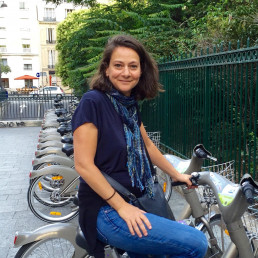
Sophie Nenner
Bicycle Transit Systems
Sector: For-Profit
Why are you interested in being a NABSA Board Member?
I would be honored to serve another term as a NABSA Board Member so that I can further support the growth and success of the bike share industry. Over the past four years, I have brought industry colleagues to share their experiences and perspectives during Policy Working Group discussions and as panelists during NABSA conferences and webinars. As a Board Member, I have also directly contributed to advocating for policies at the state or federal levels that ultimately will benefit the micromobility industry and its users. In looking toward the future, a lot of work is still needed to expand bike share and micromobility access in our communities. Having the opportunity to advocate for bike infrastructure, funding, and influence national and local policy, is both personally and professionally meaningful to me. I believe NABSA can play a role in addressing climate change through the advocacy of transportation programs that are green, accessible, and inclusive. I would be thrilled to continue taking an active part in the Executive Committee as the NABSA Treasurer and, together with the NABSA Board and other key stakeholders, to contribute to membership development activities, policy advocacy initiatives and the long-term strategy of the organization. It would be a great privilege to continue to be a force to the movement towards greater access to bikes.
What skills and experience would make you a good NABSA Board Member?
I have 20 years of experience in leadership and project management across the bike share, electric vehicle and bicycle industries. I have led businesses and have experience serving in Information Technology, Finance, and Logistics roles for companies from various sectors in France, Spain, Argentina, and in the United States. These experiences have provided me with a diverse and broad professional background. In addition to my international experience in the micromobility industry, I have also done a great deal of work in partnership with government which is critical as we build and grow the industry.
I am an entrepreneur at heart, a strategic partner in all that I do, and I am passionate about working with communities and partners to reduce our carbon footprint through transportation alternatives — one of the greatest threats to our environment. In 2005, I started my own e-bike business in Paris (one of the very first!), witnessed Velib’ launch a couple of years later and since, have nurtured relationships with stakeholders of this iconic system. I moved to Los Angeles in 2010 and worked for an electric car startup before joining Bicycle Transit Systems (BTS) as the General Manager of Metro Bike Share in 2016. I am also a lifelong bike commuter and currently serve as a board member of a local chapter of Safe Routes to Schools.
I deeply believe in education and advocacy for alternative transportation modes to cars. I have a diverse perspective from residing and working in the bicycle industry on three different continents, as well as navigating and overcoming challenges as a bike share program leader in Los Angeles–one of the biggest cities in North America and one of the most challenging cities for transportation access. In all my experience I use bring enthusiasm, passion and dedication. Being on the NABSA board gives me the opportunity to utilize my skills and experience to serve, contribute, and advocate for greater bike share infrastructure in North America.
Gabriela Becerra - Board Nominee

Gabriela Becerra
BKT bici pública
Sector: For-Profit
Why are you interested in being a NABSA Board Member?
Is essential that Mexico continues to have representation on the NABSA Board. For two years as a Board member, I have participated and been actively involved in the DEIB and Research & Data committees.
As a speaker at NABSA for more than 3 years, I have brought a feminist vision and the experiencia and diversity from Mexico, which is important to continue promoting in the Board.
As part of BKT, the systems we operate are an example that it is possible to consider shared micromobility as a subsidized public policy, which I believe is extremely important to make systems more diverse and accessible.
NABSA can and should play a more important role in Mexico, and as part of the Board I will continue promoting it in our country with associations and key players in mobility.
What skills and experience would make you a good NABSA Board Member?
In addition to being part of the board for 2 years, I have 5 years of experience in the industry, but over 10 years of personal interest and passion for micromobility.
As a Mexican sociologist and feminist, I bring a vision of how important it is to consider gender and intersectionality, both in data and in the diversity agenda.
Within my work experience, I bring both research and communication knowledge. I have participated in the international RFP for Mexico City, and from the private sector I know both the day-to-day of the systems, as well as the treatment and work with public agencies that supervise them.
Being on the NABSA board allows me to continue sharing my passion and knowledge as a micromobility user and collaborator. As well as my experience as part of the team that operates the two largest and most important systems in Mexico.
About the Shared Micromobility Industry
Shared Micromobility
State of the Industry Reports
NABSA produces the annual Shared Micromobility State of the Industry Report - the only report of its kind for North America. This page summarizes shared micromobility's trends and successes for the most recent year and includes links to previous reports.
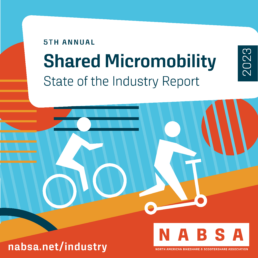
2023 Shared Micromobility
State of the Industry Report
On August 6th, NABSA released the fifth annual Shared Micromobility State of the Industry Report for North America. The 2023 State of the Industry Report demonstrates shared micromobility’s continued viability and strength as an important mode in the public transportation ecosystem, and shows an industry that continues to grow, mature, electrify, and gain efficiencies and effectiveness. In 2023, at least 172 million shared micromobility trips were taken in 421 cities across North America.
Evolution and Maturity
Over the last fifteen years, shared micromobility has grown, evolved, and strengthened as an industry. Shared micromobility trips and the number of cities with shared micromobility systems are at the highest levels to date.

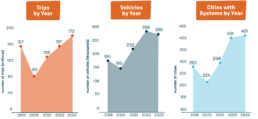
172 Million Trips
Across North America in 2023
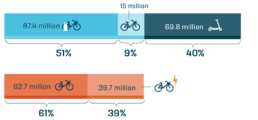
280 Thousand Vehicles
Deployed Across North America on an average day in 2023

Shared Micromobility in North America
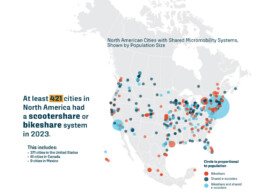
*The word cities is used to denote local jurisdictions or municipalities throughout this report. On occasion, the word cities is used as a catch-all that may include metro regions or counties in which shared micromobility systems operate; when this happens, the geography will be specified in the text and/or the methodology section.
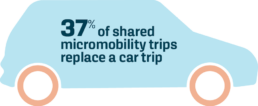
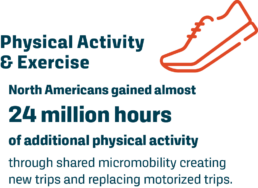

Electrification Trends
Electrification trends continue to grow, as electrified shared micromobility fleets gain in popularity and usage.
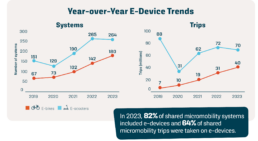
Shared Micromobility as Public Transportation

Transportation Equity
Shared micromobility systems continue to provide a range of programs to advance equity.
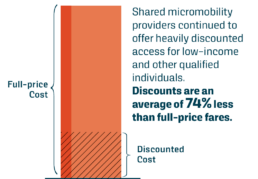
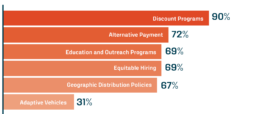
How NABSA Supports the Industry
The North American Bikeshare & Scootershare Association (NABSA) collaborates across sectors to grow shared micromobility and its benefits to communities, creating a more equitable and sustainable transportation ecosystem. NABSA is a nonprofit organization dedicated to providing resources, education, and advocacy for the shared micromobility industry, and to creating spaces for the industry’s public, private, and nonprofit sectors to convene and empower each other. In 2023, NABSA had 78 members from six countries.
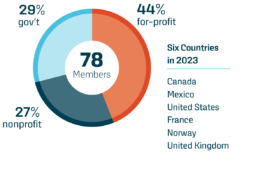
Find out so much more in the full 2023 report!
Previous State of the Industry Reports
State of the Industry: 2022
On August 10th, NABSA released the fourth annual Shared Micromobility State of the Industry Report for North America. The 2022 State of the Industry Report shows that shared micromobility ridership across North America returned to pre-pandemic levels in 2022, and reached the highest number of cities with systems across North America yet. In 2022, at least 157 million shared micromobility trips were taken in 401 cities across North America. Systems are expanding as well, with the highest number of deployed shared micromobilty vehicles to date– 289,000.
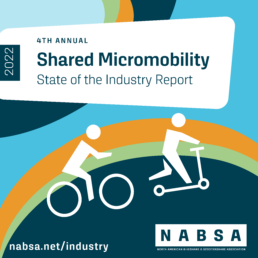
Resilience and Growth
In 2022, trip-making re-established itself to pre-pandemic levels, and there was a rapid increase in the number of cities with shared micromobility. The ecosystem of shared micromobility vehicles continued to evolve, with e-devices (e-scooters and e-bikes) growing in usage and popularity.
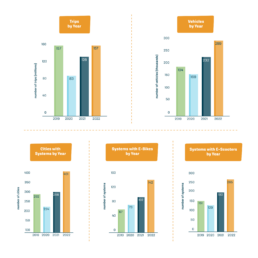
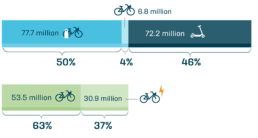
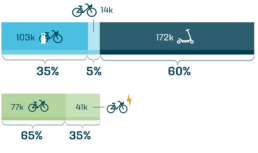
Shared Micromobility in North America
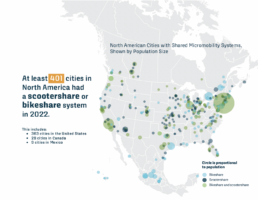
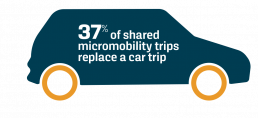
Physical Activity & Exercise
Gained almost 18.7 million hours of additional physical activity by creating new trips or by replacing motorized trips.
Reduced Greenhouse Gas Emissions
Offset approximately 74 million pounds (34 million kg) of carbon dioxide emissions by replacing car trips.
*These reduction factors do not take into account operations, externalities, or lifecycle costs for shared micromobility or for driving, as data for these calculations was unavailable.
Electrification Trends
Electrified shared micromobility fleets are growing in popularity and usage.
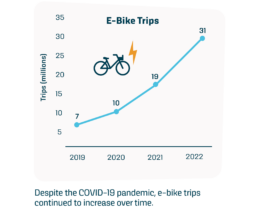
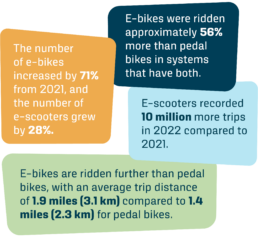
Shared Micromobility as Public Transportation
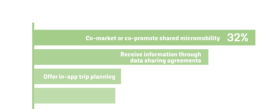

Transportation Equity
Shared micromobility continues to remain at the forefront of transportation equity. Shared micromobility providers continued to offer equity programs including heavily discounted access for low-income and other qualified individuals.
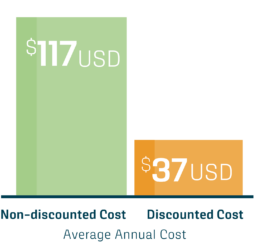
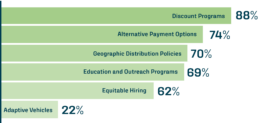
State of the Industry: 2021
On August 3rd 2022, NABSA released the third annual Shared Micromobility State of the Industry Report for North America. The 2021 report tells the second half of the COVID-19 story and further demonstrates the resilience, importance, and demand for shared micromobility. Some of the metrics in the report include country-by-country breakdowns of ridership and vehicle types, physical activity gained, greenhouse gas offset, mode shift, rider representation, economic impacts, and much more. New additions to the 2021 State of the Industry report include a section outlining shared micromobility in policy, case studies, and an expanded transit integration section.
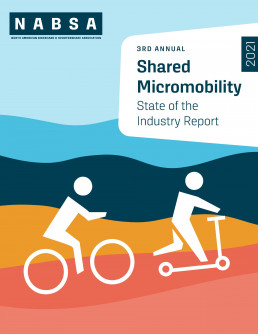
COVID-19 Pandemic Resilience
Shared micromobility continued to show remarkable resilience and rebound from the impacts of the pandemic in 2021. The number of systems and vehicles was above 2019 levels, and while total trip numbers were below 2019 numbers, monthly ridership started to surpass 2019 levels towards the middle of 2021.
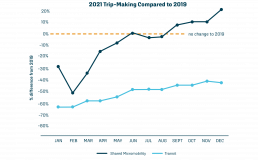
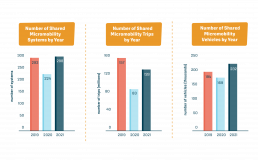
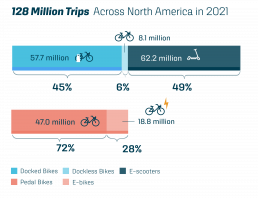
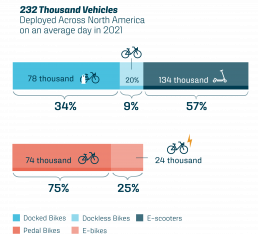
In 2021, at least 298 cities* had at least one bikeshare or e-scooter system and 97 had both.
This includes:
- 273 cities in the United States
- 19 cities in Mexico
- 6 cities in Canada
*The word cities is used to denote local jurisdictions or municipalities throughout this report. On occasion, the word cities is used as a catch-all that may include metro regions or counties in which shared micromobility systems operate; when this happens, the geography will be specified in the text and/or the methodology section.
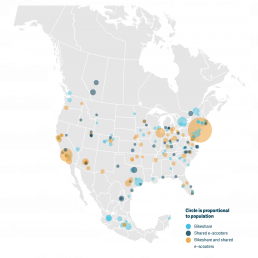
Physical Activity & Exercise
Gained almost 15.5 million hours of additional physical activity by creating new trips or by replacing motorized trips.
Reduced Greenhouse Gas Emissions
Offset approximately 54 million pounds of carbon dioxide emissions by replacing car trips.
*These reduction factors do not take into account operations, externalities, or lifecycle costs for shared micromobility or for driving, as data for these calculations was unavailable.
E-bikes were ridden approximately 36% more than regular pedal bikes.
The use and popularity of e-bikes is increasing in the shared micromobility industry.
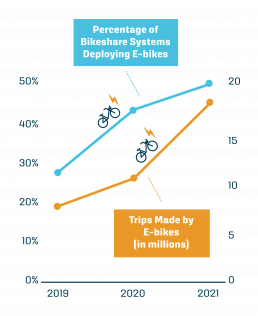
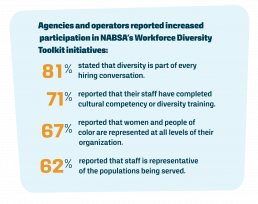

Shared Micromobility as Public Transportation


Shared Micromobility Advancing Policy Objectives
Shared micromobility plays a key role in delivering climate, equity, health, transportation, and other public benefits. Shared micromobility can be included in a variety of regulations and policies at local, regional, state/provincial, and federal levels.
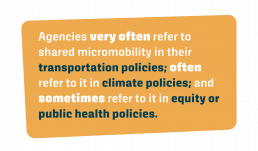
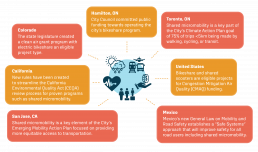
State of the Industry: 2020
On August 5th, 2020, NABSA released the second annual Shared Micromobility State of the Industry Report for North America. The 2020 report quantifies the impact of the COVID-19 pandemic on shared micromobility and demonstrates the industry’s response and resilience during this time to provide essential mobility services. The report also compares trends from 2019 and presents new research that shows the industry’s impact in North America.
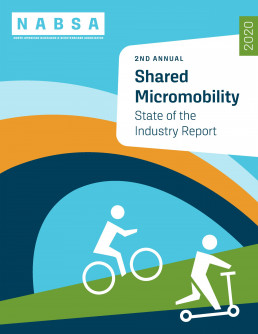
COVID-19 Response and Resilience
2020 was a tough year for everyone, but the shared micromobility industry proved its resilience and played an important part in keeping North America moving by providing programs and services where it was most needed.
- 65% of operators provided free or discounted rides to essential workers
- About 50% of shared micromobility operators reported an increase in first-time riders
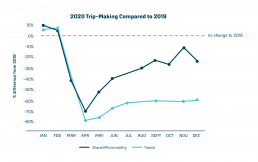

In 2020, at least 224 cities* had at least one bikeshare or e-scooter system and 72 had both.
This includes:
- 203 cities in the United States
- 14 cities in Mexico
- 7 cities in Canada
*The word cities is used to denote local jurisdictions or municipalities throughout this report. On occasion, the word cities is used as a catch-all that may include metro regions or counties in which shared micromobility systems operate; when this happens, the geography will be specified in the text and/or the methodology section.
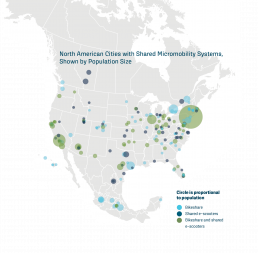
Physical Activity & Exercise
Gained almost 12.2 million hours of additional physical activity by creating new trips or by replacing motorized trips.
Reduced Greenhouse Gas Emissions
Offset approximately 29 million pounds of carbon dioxide emissions by replacing car trips.
*These reduction factors do not take into account operations, externalities, or lifecycle costs for shared micromobility or for driving, as data for these calculations was unavailable.
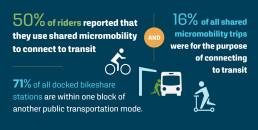

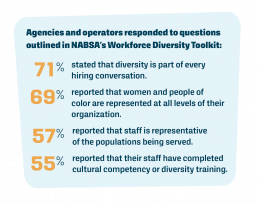
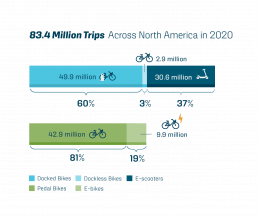
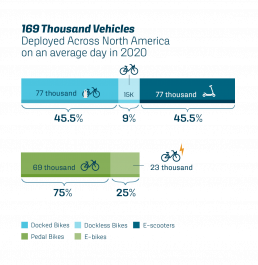
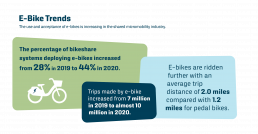
State of the Industry: 2019
Over the last 14 years, the shared micromobility industry has grown from a handful of city bikeshare programs, to a complex ecosystem of bikeshare and shared e-scooter systems with a wide variety of vehicle types, system models, and ownership configurations. Cities have come to rely on shared micromobility as an integral part of the transportation network, increasing transportation options and contributing to environmental, equity, and public health goals.
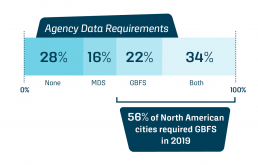
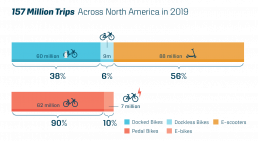
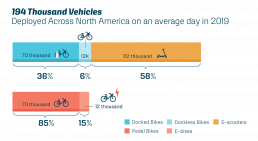
Physical Activity & Exercise
Gained almost 30 million hours of additional physical activity by creating new trips or by replacing motorized trips.
Reduced Greenhouse Gas Emissions
Offset approximately 65 million pounds of carbon dioxide emissions by replacing car trips.
*These reduction factors do not take into account operations, externalities, or lifecycle costs for shared micromobility or for driving, as data for these calculations was unavailable.
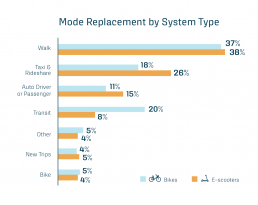
36% of shared micromobility trips replace a car trip.
User surveys show that shared micromobility in place of a wide variety of modes, and that 5% of trips are new trips that wouldn't have been taken otherwise.
In 2019, at least 292 cities had at least one bikeshare or e-scooter system and 99 had both.
This includes:
- 264 cities in the United States
- 17 cities in Mexico
- 11 cities in Canada
*The word cities is used to denote local jurisdictions or municipalities throughout this report. On occasion, the word cities is used as a catch-all that may include metro regions or counties in which shared micromobility systems operate; when this happens, the geography will be specified in the text and/or the methodology section.
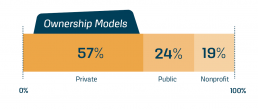
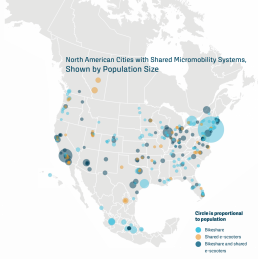
Topics in the report include:
- Benefits of Shared Micromobility
- Year-Over-Year Trends
- System Statistics & Characteristics
- Trip & Vehicle Type Breakdowns
- Economic Impacts
- Shared Micromobility for Climate Action
- Transportation Access & Equity
- Electrification Trends
- Operator Practices
Have questions about the State of the Industry Reports?
Send all media inquiries and any questions about the report to hello@nabsa.net.
Download the Latest Report
NABSA Committees
NABSA Committees
Participation in NABSA committees is a leadership opportunity for members, and essential to the work that NABSA does. Through committee engagement, participating members provide insight and guidance for NABSA’s work, and have the opportunity to network and collaborate with other members in the process. The following NABSA committees are open to general member participation.
Conference Committee
The Conference Committee helps in the planning and execution of the Annual Conference, and the selection of future host cities. This includes setting themes and topics for the conference sessions, selecting keynotes, reviewing presentation proposals, and helping to organize sessions, among other duties.
Policy Committee
The Policy Committee is a forum for NABSA members to engage in NABSA’s policy and advocacy work, organize around shared policy goals, and participate in peer-to-peer sharing and learning on policy issues that members are working on across North America.
Diversity, Equity, Inclusion, & Belonging Committee
The Diversity, Equity, Inclusion, & Belonging (DEIB) committee continues to explore what meaningful role NABSA can and should play in supporting the shared micromobility industry in moving from awareness to greater action toward DEIB workforce objectives. The DEIB committee consults and collaborates with various DEIB projects, such as the Building a Better Shared Micromobility Industry: Best Practices for More Diverse and Inclusive Workplaces toolkit.
Research & Data Committee
The Research and Data Committee is responsible for helping to guide the annual State of the Industry Report, stewarding additional research and data projects, and assists in building relationships with shared micromobility researchers to help expand the content of the knowledge share database.
Resources
Resources
NABSA hosts a variety of resources to help move the shared micromobility industry forward.
NABSA advocates to grow shared micromobility and its benefits to communities and provides resources to help you advocate for shared micromobility.
Access NABSA’s Workplace Toolkit developed in partnership with the Better Bike Share Partnership.
Find resources and information for shared micromobility professionals. The NABSA Knowledge Share is a benefit for member organizations, and most documents are only accessible with a member login.
Members login to the member portal where they can access their account, profile, member directory, and access the knowledge share.
Read about the latest NABSA happenings and shared micromobility news.
NABSA hosted this presentation to help those who are thinking about starting a system, planning a system or have recently launched a system to learn what to consider and enhance their planning process.
Shared micromobility is part of the public transportation ecosystem. Operators, cities, researchers and other transportation and mobility stakeholders use mobility data to plan, optimize, and grow transportation networks.
NABSA produces the annual Shared Micromobility State of the Industry Report – the only report of its kind tracking the trends, growth, and success of shared micromobility across North America.
NABSA hosts regular virtual events on the topics that are important to our members. NABSA events feature leaders in the industry sharing their expertise and lessons learned. Many of these events are member-only, but some crucial topics are open to the public.
Membership
Membership
NABSA collaborates across sectors to grow shared micromobility and its benefits to communities, creating a more equitable and sustainable transportation ecosystem.
Why Join NABSA?
NABSA is the industry’s membership organization with representation from system owners, operators, host cities, equipment manufacturers, and technology and service providers. Founded in 2014, NABSA is a 501(c)(3) nonprofit organization dedicated to providing resources, education, and advocacy for the shared micromobility industry, and to creating spaces for the industry’s public, private, and nonprofit sectors to convene and empower each other. NABSA provides opportunities for members to connect with, learn from, and share with each other while advocating for the positive change we need to weave micromobility into the fabric of transportation.
Industry Leadership
NABSA provides access to education, advocacy information, research and guidance, and opportunities for leadership and growth. Member organizations have the opportunity to elect and nominate candidates for the NABSA Board of Directors, participate in committees, and help shape the future of the industry.
Core Values
Safety, Diversity, Equity, Inclusion, & Belonging (DEIB), Integrity, Health and Sustainability: these are the foundational values that guide NABSA, our work and members. NABSA members agree to a Code of Conduct addressing these values, and through membership in NABSA, are known for upholding these values in their work and the shared micromobility community.
Annual Conference
The NABSA Annual Conference is the leading global venue for shared micromobility and transportation leaders, practitioners, operators, and equipment providers to tackle important issues facing the industry. Join us to learn, network, and chart the future of shared micromobility.
Annual Shared Micromobility State of the Industry Report
NABSA produces the annual Shared Micromobility State of the Industry Report for North America. As the only report of its kind, it captures in-depth metrics about the industry, allowing us to view trends, gain insights, and advocate for the benefits of shared micromobility. NABSA cultivates relationships with researchers, creating conversation and information flow between shared micromobility research and practice.
Advocacy
NABSA is the leading voice of and for the shared micromobility industry. NABSA advocates for policy change that supports and promotes the growth of shared micromobility and its benefits to communities. We maintain a bill tracker tool and continually develop resources and opportunities to equip our members with tools to advocate for shared micromobility.
Education
Throughout the year, NABSA hosts an industry-specific virtual event series, as well as continually develops resources to support our members and their work. As a member organization, every one of your employees will have access to our virtual events and Knowledge Share database with hundreds of articles and resources.
Network Cultivation
NABSA membership opens the door to a network of shared micromobility leaders throughout the US, Canada, and Latin America working in all sectors and areas that make shared micromobility happen– system owners, operators, host cities, equipment manufacturers, technology and service providers, and more. Connections can be made through our members-only email listserv, Slack Workspace, Member Center, and social media profiles.
Membership Includes
- Complimentary ticket(s) to the NABSA Conference
- Listing on NABSA website
- Opportunity to nominate and elect NABSA Board of Directors
- Opportunity to participate in NASBA committees open to general members
- Immediate access to the rapidly growing community of NABSA members
- Unlimited, free access for all employees to NABSA virtual events and Knowledge Share database
- Recognition for upholding industry quality standards as a NABSA member provider
t
Ready to join NABSA?
Join Us!
NABSA DUES
Dues are essential for the financial health of NABSA and our ability to offer value to our members. Dues contribute to the benefits and value that each member organization receives. The sliding scale proxies that we utilize is the mechanism by which to assess appropriate dues level based on organizational size and scale of engagement within the shared micromobility industry.
Sponsorship Opportunities
Sponsorship Opportunities
NABSA sponsorships provide your organization with the opportunity to gain exposure with NABSA members and the shared micromobility industry’s public, private, and nonprofit sectors, and supports the work of NABSA and shared micromobility. NABSA has an audience of over 4,000 subscribers and followers through our communications channels, and is the best place to access shared micromobility professionals. Gain exposure with the shared micromobility audience and demonstrate your commitment to the industry by sponsoring the NABSA conference, a webinar, or our newsletter.
Conference Sponsorship
The NABSA Annual Conference is the only event of its kind globally. It is an international convening of all sectors involved in shared micromobility planning and implementation– host cities, equipment manufacturers, operators, technology providers, consultants, data analytics companies, and other service providers that contribute to realizing shared micromobility in communities. Sponsorship provides multiple venues and collateral items to connect you to the people you want to know, and who want to know you. Gain exposure to city officials, operators, and private industry professionals, and make your mark in the shared micromobility industry.
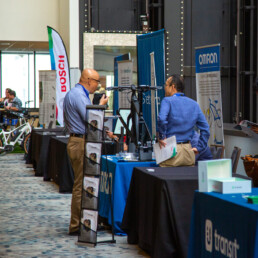
A variety of conference sponsorship levels and packages are available each year, from Presenting to exhibiting to supporting meals and receptions and can include:
- Logo placement on conference materials including the conference program, signage, website, presentation slides, and emails
- Recognition at a plenary, reception, or meal
- Social media recognition
- Exhibitor space
More information about upcoming conference sponsorship opportunities can be found on this year’s conference page.
Webinar Sponsorship
Work with NABSA to curate the content of a webinar and choose whether it will be a public or members-only event with a 30-Minute Sponsored Webinar, or get sponsor recognition at an upcoming NABSA webinar by selecting the Sponsor-Supported Webinar option.
Newsletter Sponsorship
Have your logo and link to your project, tool or website included in a NABSA Newsletter that is sent to the cross-sector shared micromobility community.


